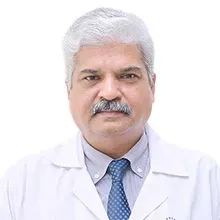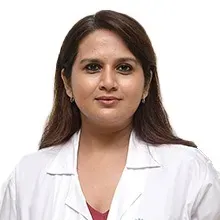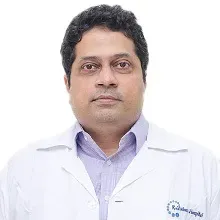About Doctor DR. RAJESH MISTRY
About
Dr. Rajesh Mistry is one of the best-known oncosurgeons in the field of thoracic, head, and neck oncology. Thoraco-laparoscopic esophagectomy and thoracoscopic surgery are two areas of great
interest for Dr. Mistry. He has conducted more than 1,000 procedures and has a wealth of experience spanning over 25 years. Dr. Mistry received his MBBS and MS degrees from Mumbai University's KEM Hospital and the renowned Seth G. S. Medical College. Additionally, he received training in surgical oncology at Tata Memorial Hospital. Dr. Mistry has held the position of principal investigator for a number of clinical trials examining various aspects of oesophageal (amount of nodal dissection, significance of induction chemotherapy, novel technique for laparoscopic jejunostomy) and lung cancer (PET CT in lung cancer, pulmonary metastasectomy) conditions. For the preservation of salivary function in radiation treatment patients in India, he invented the "submandibular salivary gland transfer." He has written chapters for books and published a number of scholarly publications in peer-reviewed journals.
Work Experience
25 years of experience
At Kokilaben Hospital, Dr. Rajesh Mistry serves as Director of Oncology and Consultant Surgical Oncology. In 1984, Dr. Mistry graduated with distinction from Seth G. S. Medical College and KEM Hospital, Mumbai University. In 1985, he served as an intern and finished his general surgical residency at KEM Hospital in Mumbai. At Tata Memorial Hospital in Mumbai, he finished his surgical oncology training in 1992. In 1992, Dr. Mistry joined Tata Memorial Hospital as an assistant surgeon in the field of head and neck oncology. He later rose to the position of professor and surgeon in charge of a head and neck unit. In 2002, he changed his location to thoracic surgical oncology and was appointed service chief and professor. In 2009, Dr. Mistry joined the Kokilaben Dhirubhai Ambani Hospital's Center for Cancer. He oversees the department of oncology and serves as a consultant surgeon for thoracic, foregut, and head and neck cancers. Following are some of his more recent working experiences:
-
Director, Kokilaben Dhirubhai Ambani Hospital, Mumbai
-
Senior Consultant, Kokilaben Dhirubhai Ambani Hospital, Mumbai
-
Consultant, Assistant Surgeon, Tata Memorial Hospital
Associated with Hospital
List of Treatments
-
Adrenal Cancer Treatment: One or both of the tiny, triangular glands (adrenal glands) that are situated on top of your kidneys might develop adrenal carcinoma, a rare kind of cancer. A malignancy that has progressed to tissues close to the adrenal cortex is surgically removed.
-
Chemotherapy for Solid Malignancies: Chemotherapy for solid malignancies is a treatment that uses drugs to destroy cancer cells. As the chemicals affect the entire body, they can destroy cancer cells in the tumor as well as any cells that have broken out of it and traveled through the blood or lymph to another place.
-
Radiotherapy: High doses of radiation are used in radiation therapy, commonly known as radiotherapy. It is used as a cancer treatment to eradicate cancer cells and reduce tumor size. As with x-rays of the teeth or shattered bones, radiation is utilized at low levels in x-rays to view inside the body.
-
Chronic Lymphocytic Leukemia (CLL): In the case of chronic lymphocytic leukemia, an excessive number of lymphocytes are produced by the bone marrow. Red blood cells, white blood cells, and platelets can all be impacted by leukemia. Fatigue and enlarged lymph nodes are two indicators of chronic lymphocytic leukemia.
-
IMRT: Conformal radiotherapy includes intensity-modulated radiation (IMRT). With conformal radiotherapy, the radiation beams are precisely shaped to fit the cancerous tissue. A linear accelerator (LINAC), a common radiation device, can be used for IMRT.
-
Tumors and Cysts: A cyst is a sac that can contain air, liquids, or other substances. Any portion of the body, including bones, organs, and soft tissues, can develop a cyst. Most cysts are noncancerous. Tumors are defined as any unwanted mass of cells or inflammation in the body. As compared to cysts, tumors are cancerous. Surgery is performed to treat tumors and cysts.
-
Melanoma Treatment: Disorders of the tumor cells are also known as melanoma. The primary therapy for melanoma is surgical removal of the original melanoma on the skin, known as excision. Most melanomas are discovered when they are less than 1.0 mm thick, and minimally invasive treatment is frequently all that is required.
-
Giant Cell Tumor Treatment: Curettage is the most commonly utilized surgical treatment to treat giant cell tumors. Special devices are used to remove the tumor from the bone during curettage, for which a bone transplant is performed. The open wounds were filled with a bone transplant after curettage to strengthen the bone.
Oral Cancer Treatment: Oral cancers can form on the tongue, the tissue that covers the mouth and lips, beneath the tongue, at the base of the tongue, and in the neck area towards the back of the mouth. Treatment for oral cancer includes a combination of surgery, radiotherapy, or chemotherapy.
Education and Training
Trainings/Specializations
Special Interest
 Associated with hospitals
Associated with hospitals
Envisioning the goals & paving the path to success for the organization.
Book Appoinment
Similar Doctors In Andheri West, Mumbai
Envisioning the goals & paving the path to success for the organization.














